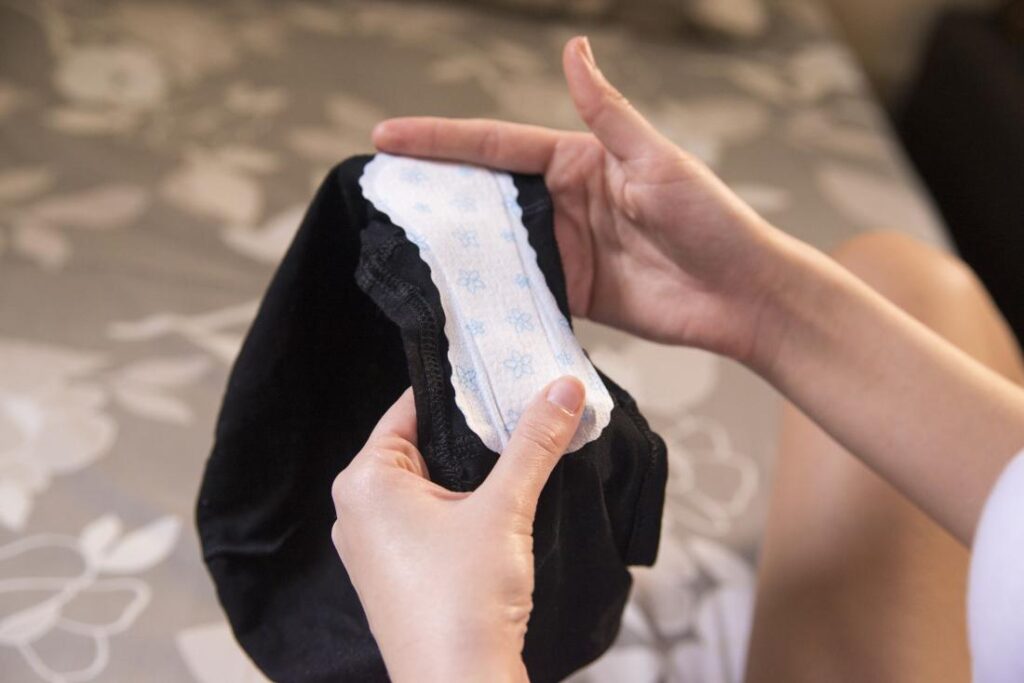Irregular spotting can be frustrating and sometimes confusing for many women. It refers to light bleeding that happens outside of your normal menstrual cycle. While it’s often harmless, it can sometimes signal underlying issues such as hormonal imbalance, stress, changes in birth control, or even certain health conditions. Instead of immediately turning to medication, many people prefer to explore natural ways to help balance their hormones and support a regular cycle.
In this post, we’ll discuss some of the best natural remedies for irregular spotting, including herbal solutions, lifestyle changes, and nutrition tips that can help bring your body back into balance.
Understanding Irregular Spotting
Irregular spotting happens when you notice light bleeding or small drops of blood between your normal periods. It can vary in color from light pink to brown and may last for a few hours or several days. While occasional spotting is usually nothing to worry about, frequent or unexplained spotting could be your body’s way of signaling that something is off.

Several factors can cause irregular spotting, including stress, hormonal changes, birth control use, ovulation, or underlying conditions such as polycystic ovary syndrome (PCOS), thyroid disorders, or uterine fibroids. Even lifestyle habits like poor diet, lack of sleep, or sudden weight changes can affect your menstrual rhythm.
Recommended: What Does Brown Spotting Before Period Mean?
Understanding what’s normal for your body is the first step toward managing spotting naturally. By identifying possible triggers and adopting healthier habits, you can help regulate your menstrual cycle and maintain better reproductive health.
How Hormonal Imbalance Triggers Spotting
Hormones play a major role in regulating your menstrual cycle, and even a small imbalance can cause unexpected spotting. Estrogen and progesterone are the two main hormones that control your periods. When these hormones are not properly balanced, the lining of your uterus (endometrium) may shed at irregular times, leading to light bleeding or spotting between cycles.
Low progesterone levels are one of the most common causes of irregular spotting. This hormone helps maintain the uterine lining, so when it drops too early, spotting can occur before your period actually starts. On the other hand, excess estrogen can cause the uterine lining to thicken and shed unevenly, also leading to irregular bleeding.
Other factors such as stress, poor diet, lack of sleep, and certain medications can also disrupt hormonal balance. Supporting your hormones naturally through a healthy lifestyle, balanced nutrition, and stress management can go a long way in preventing irregular spotting and promoting overall menstrual health.
Best Natural Remedies That Help Regulate Spotting
If you often experience irregular spotting, turning to natural remedies can help bring your cycle back to balance. These remedies work by supporting hormonal health, improving blood circulation, and reducing inflammation in the body. Here are some of the most effective natural options:
1. Ginger Tea
Ginger helps stimulate blood flow and reduce inflammation in the uterus. Drinking a cup of warm ginger tea daily can support a more regular menstrual cycle and relieve cramps associated with spotting.
Recommended: Is Ginger Tea Good For Prostate Enlargement?
2. Cinnamon
Cinnamon is known for its ability to balance hormones and improve insulin sensitivity, which can be especially helpful for women with PCOS. You can add cinnamon powder to your meals or drink it as tea to help regulate your cycle naturally.
3. Turmeric
Turmeric contains curcumin, a powerful anti-inflammatory compound that supports hormonal balance and reduces menstrual irregularities. Mixing turmeric with warm milk or adding it to smoothies can be a soothing remedy.
4. Chasteberry (Vitex Agnus-Castus)
This herb is widely used to regulate menstrual cycles by balancing the levels of progesterone and estrogen. Taking chasteberry supplements under proper guidance can help reduce irregular spotting and promote cycle regularity.
5. Aloe Vera Juice

Aloe vera helps stabilize hormonal fluctuations. Drinking fresh aloe vera juice (preferably in moderation) before breakfast can support a balanced cycle.
6. Apple Cider Vinegar
Apple cider vinegar may help detoxify the body and balance hormones. Mixing one tablespoon with warm water and drinking it in the morning can help regulate your period over time.
These natural remedies work best when combined with a healthy diet, stress management, and proper sleep. Consistency is key, and while these methods are gentle on the body, it’s always best to consult a healthcare provider before starting any herbal supplements, especially if you have an existing health condition.
Nutrition Tips: Foods That Help Regulate Your Cycle
What you eat has a direct impact on your hormones and menstrual health. A balanced diet filled with nutrient-rich foods can help support hormone production, reduce inflammation, and keep your cycle more regular. Here are some of the best foods to include in your diet if you’re experiencing irregular spotting:
1. Iron-Rich Foods
Spotting and irregular bleeding can sometimes lead to mild iron loss. Eating foods like spinach, lentils, red meat, pumpkin seeds, and beans helps restore your iron levels and prevent fatigue or dizziness during your cycle.
Recommended: Top 5 Foods To Avoid While Taking Letrozole For Fertility
2. Foods High in Vitamin B6
Vitamin B6 plays a key role in balancing estrogen and progesterone levels. Foods like bananas, avocados, eggs, salmon, and chickpeas can help keep your hormones steady throughout your cycle.
3. Magnesium-Rich Foods
Magnesium helps relax muscles and supports overall hormone health. Incorporate leafy greens, nuts, seeds, and dark chocolate to ease cramps and regulate your period.
4. Healthy Fats
Omega-3 fatty acids, found in fish (like salmon and mackerel), flaxseeds, chia seeds, and walnuts, support hormone production and reduce inflammation. These fats also help maintain a healthy uterine lining.
5. Fiber-Rich Foods
Whole grains, fruits, and vegetables help flush out excess hormones from the body by improving digestion. This can help keep estrogen levels balanced and reduce irregular bleeding.
6. Stay Hydrated
Drinking enough water helps maintain blood volume and supports the body’s natural detox process. Herbal teas like chamomile, spearmint, or raspberry leaf tea can also be soothing and beneficial for reproductive health.
7. Limit Caffeine and Processed Sugar
Too much caffeine or refined sugar can disrupt hormone balance and increase stress hormones, which may worsen spotting. Opt for natural sweeteners and herbal alternatives instead.
By nourishing your body with these wholesome foods, you give your hormones the support they need to function properly, helping you achieve a more stable and predictable menstrual cycle.
Lifestyle Changes to Prevent Irregular Spotting
Simple lifestyle adjustments can make a big difference in regulating your menstrual cycle and preventing irregular spotting. Your daily habits, like how you eat, sleep, and manage stress, directly affect your hormone levels and reproductive health. Here are some effective lifestyle changes to consider:
1. Manage Stress Effectively
Chronic stress can interfere with hormone production, especially estrogen and progesterone, leading to spotting or missed periods. Practicing relaxation techniques such as deep breathing, meditation, yoga, or even taking short walks can help lower stress levels and keep your hormones balanced.
Recommended: Best Supplements to Regulate Hormones for Spotting
2. Maintain a Healthy Weight

Being underweight or overweight can disrupt your hormone balance and menstrual regularity. Aim for a balanced diet with plenty of fruits, vegetables, and whole grains, and include regular exercise to support a healthy body weight and hormonal stability.
3. Get Enough Sleep
Your body restores itself during sleep, and lack of rest can raise stress hormones like cortisol, which affect your reproductive hormones. Try to get at least 7 to 8 hours of sleep each night and maintain a consistent sleep schedule.
4. Exercise Regularly but Don’t Overdo It
Moderate physical activity improves circulation, reduces stress, and helps balance hormones. However, excessive or intense exercise can lower estrogen levels and cause irregular spotting. Stick to activities like brisk walking, yoga, or light aerobics.
5. Avoid Smoking and Limit Alcohol Intake
Smoking and heavy drinking can disrupt your hormonal system and negatively affect menstrual health. Reducing or quitting these habits supports a healthier cycle and overall well-being.
6. Track Your Cycle
Use a period tracking app or a simple calendar to note when spotting occurs. Tracking helps you identify patterns, possible triggers, and when your cycle becomes more regular after lifestyle changes.
7. Keep Your Body Hydrated
Staying hydrated supports good blood flow and helps your body flush out toxins. Drink plenty of water throughout the day and include herbal teas for added benefits.
Recommended: Does Birth Control Cause Dry Mouth?
Making these small yet consistent changes can help your body regain its natural rhythm, reduce irregular spotting, and promote better reproductive health in the long run.
When Natural Remedies Aren’t Enough
While natural remedies and lifestyle changes can be very effective for managing irregular spotting, sometimes they may not completely solve the problem. Persistent or severe spotting could be a sign of an underlying medical condition that requires professional care. It’s important to listen to your body and know when to seek medical advice.
If your spotting lasts for several weeks, happens frequently between periods, or comes with pain, fatigue, dizziness, or unusual discharge, it’s best to consult a healthcare provider. Conditions such as polycystic ovary syndrome (PCOS), endometriosis, uterine fibroids, thyroid disorders, or infections can cause irregular bleeding and may need medical treatment.
Your doctor may recommend blood tests, pelvic exams, or ultrasounds to identify the cause. Once the underlying issue is known, a proper treatment plan can be created, which may include medications, hormone therapy, or other interventions.
Natural methods are great for supporting your overall reproductive health, but combining them with professional guidance ensures you get the safest and most effective care for your body.
Conclusion
Irregular spotting can be unsettling, but in many cases, it’s your body’s way of signaling that something needs attention. With the right combination of natural remedies, a balanced diet, and healthy lifestyle habits, you can often restore hormonal balance and support a more regular menstrual cycle. However, it’s equally important to pay attention to your body’s signals and seek medical advice if the spotting persists or becomes more frequent.
Taking care of your reproductive health starts with understanding your cycle, nourishing your body with the right foods, managing stress, and maintaining a healthy routine. By staying consistent and mindful, you can achieve better hormonal balance, reduce irregular spotting, and enjoy improved overall well-being.
